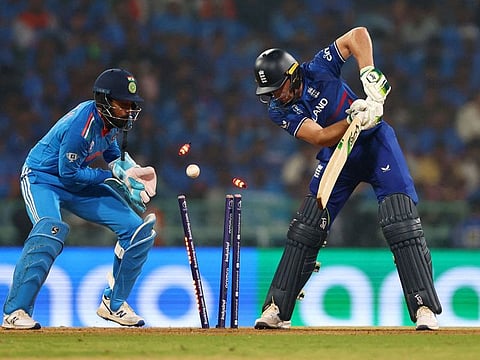Why England must tweak their gameplan for One-Day Internationals
Incessant aggression hasn’t helped in the Cricket World Cup on Indian pitches

England seemed to have forgotten how to win cricket games. Even when they had the opposition on the mat, England are unable to finish the job. That’s precisely what happened on Sunday in the Cricket World Cup. India struggled to a sub-par score on a tricky Lucknow pitch in the face of some excellent bowling, only for the English batters to surrender meekly.
Defending champions and one of the favourites England failed miserably, winning just one of six games, and that does no justice to the abundance of talent and experience in the team. Nine of the squad were part of the winning squad of 2019. Some of them helped win the Twenty20 World Cup in Australia last year.
A champion team cannot become a bunch of no-hopers overnight. This team had set the template for One-Day Internationals with an incessant aggression that starts from the openers and runs down to the tailenders. The positive approach remained unchanged, irrespective of the state of the match and the strength of rivals.
What’s England’s ODI template?
England had subscribed to the philosophy long before Bazball became fashionable and chief coach Brendon McCullum took charge of the England Test team. It was a strategy England adopted in 2015 when Eoin Morgan was handed the reins of the white-ball teams.
You can’t fault the plan since it won them the 2019 ODI World Cup and the 2022 Twenty20 World Cup. It made England double world champions.
Despite the professed aggression, England batters have curbed their instincts when the occasion demanded. The 2022 T20 World Cup final against Pakistan in Melbourne is a prime example. When England were in troubled waters, Ben Stokes kept them afloat with a stodgy display before he steamed away. In earlier games, openers Buttler and Alex Hales had blazed away, but the final showed that they can adapt to the changing circumstances.
Contrast that to the matches in this World Cup. England batters struggled to bat to the ball. Many, including Joe Root and Jos Buttler, were woefully out of form. Only Jonny Bairstow and Dawid Malan continued to be aggressive, while Root and Stokes were to bring discipline to the middle-order. That didn’t happen, leaving the batters in survival mode. It didn’t help.
Even the team selection was at times perplexing. How can a team go into an ODI in India with just one frontline spinner in Adil Rashid? Liam Livingstone can take wickets, but he’s no matchwinner. The move to drop Moeen Ali after an early match wasn’t prudent.
More surprising was the decision to field four seamers. Chris Woakes and Reece Topley need help from the wicket to make an impact. Mark Wood’s pace doesn’t help on flat wickets and he leaked runs in all games. To Topley’s credit, he’s been among the wickets in the matches he played.
Jos Buttler’s poor form mirrors England fortunes
A year ago, Sam Curran was the player of the T20 World Cup. That made him the most expensive overseas player in the Indian Premier League. For a player with ample IPL experience, Curran failed to deliver with the bat and ball before losing his place to David Willey.
Buttler is an IPL stalwart consistently topping the scoring charts. As a batter, he conjures victories from lost situations. We didn’t see any of that; he kept edging to the wicketkeeper. Against India, he was undone by Kuldeep Yadav’s monster leg-break, which would have flummoxed most batters.
England’s woes point to poor preparation. The T20s are such a rage that ODIs get the short shrift in international cricket. Outside bilateral series, there’s hardly any ODI played anywhere. And this affects batters more than bowlers, simply because ODI batting requires a different mindset. It allows batters to play themselves in before launching into the attack.
Games are won and lost in the second powerplay (11 to 40 overs). Here’s where spinners come into play and the scoring is pegged back. England’s batters failed to negotiate the passage of play, leaving them little to push on in the slog overs.
Where do that leave England? Right now, they are last in the 10-team points table. Which means their qualification for the 2025 Champions Trophy is in doubt, as only the top seven will join hosts Pakistan. So the remaining games are important for England.
Should England dial down their aggression? That depends on the players available. They did it successfully for seven years, so the template change depends on the skillsets and the conditions. India have borrowed the template with the openers going hard in the first powerplay, but they change and adapt according to the situation. We saw that in Lucknow.
Maybe England should look at the Indian gameplan.







